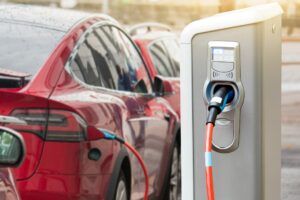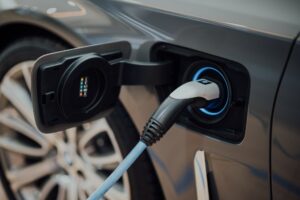The Pros and Cons of Electric Vehicles
Before purchasing an electric vehicle, you should consider price, availability, insurance, and more:Price of Electric Cars
Some people expect the price of electric vehicles to decline, but the opposite is true. The average electric car price reached $66,000 in June 2022, a 13% increase from last year. The average price of a used EV in Texas is $40,902, just under the national average of $43,000. So, why hasn’t the price decreased? For starters, recent inflation has increased the cost of nearly every good, including electric cars. Additionally, because electric vehicles are relatively new, not as many used electric cars are for sale. Unless you plan on buying a new car, an electric vehicle may not be in the cards for you. What about the money saved on gas? The availability of free EV charging stations depends on where you live—a topic we will get to later on—and the cost of gas in your area. As a general rule, high gas prices and the availability of free or solar-powered charging stations mean you can save a significant amount on gas expenses in the long run. According to the U.S. Department of Energy’s National Renewable Energy, the electricity needed to power an electric vehicle over 15 years can be as much as $14,480 cheaper than fueling a gas-powered car.Availability of Electric Vehicle Charging Stations
 If you choose to purchase an electric car, you must consider the availability of charging stations in your area. Over 48,000 electric charging stations exist in the U.S. Of these, 6,000 are DC fast electric charging stations. For perspective, around 150,000 gas stations are available for fuel-burning vehicles.
Some EV owners prefer to have a personal charging station at their homes. A Level 2 charging system, which runs on 240 volts, can recharge your car at 40+ miles of range per hour. These chargers can cost anywhere from $200 to $1,000, so take some time to look at chord length, certification, and amp rating to find a charger that works for your car.
If you choose to purchase an electric car, you must consider the availability of charging stations in your area. Over 48,000 electric charging stations exist in the U.S. Of these, 6,000 are DC fast electric charging stations. For perspective, around 150,000 gas stations are available for fuel-burning vehicles.
Some EV owners prefer to have a personal charging station at their homes. A Level 2 charging system, which runs on 240 volts, can recharge your car at 40+ miles of range per hour. These chargers can cost anywhere from $200 to $1,000, so take some time to look at chord length, certification, and amp rating to find a charger that works for your car.
Insurance Coverage for Electric Cars
You will likely have to pay more to insure an electric car than a conventional vehicle. High-end EVs with safety features will cost more to replace, so auto insurers will charge more to protect themselves against higher damage costs. Insurance costs also depend on the model of your car. The average six-month auto insurance premium is $870 for a Toyota Prius and $1,901 for a Tesla Model S. Other than the higher cost, insuring an EV is no different than insuring a standard car. Here is a list of companies that provide auto insurance for electric vehicles:Longevity of the Battery
Mild temperatures are generally preferable for battery performance and longevity. EV owners should store their cars in the shade or a garage to prevent overheating. Your battery’s total life will depend on the make and model of your car and how well you maintain the vehicle. Tesla claims their batteries last well past 200,000 miles, and Nissan claims the Nissan LEAF battery can last up to 22 years. Lower maintenance and fuel costs can save EV owners as much as $15,000 over 15 years.Distance an Electric Car Can Drive
The reduced range is one of the major cons of electric vehicles. Many EVs require a charge sooner than a standard vehicle would need to refill on gas. The average EV range is 194 miles, and the longest is 396 miles. The average car can travel between 200 and 400 miles on one tank of gas. EV battery efficiency has dramatically increased over the past few years, though. Batteries are more powerful and less expensive, and the median range of EVs has increased from roughly 94 miles per charge in 2011 to 202 miles today.Safety of Electric Vehicles
Are electric cars safe? Tests have proven that EVs are at least as safe as conventional cars, based on crash-test performance. The emergence of automated vehicles also factors into electric car safety. According to the NHTSA, higher levels of vehicle automation will prevent human error, reduce crashes, and protect drivers and pedestrians. While much of this technology is not yet available to the public, many companies have begun testing self-driving cars on public roads.Performance of Electric over Gas
One of the pros of electric cars is their increased performance over conventional vehicles. The Tesla Model S became the first production vehicle to accelerate from 0-60 in less than two seconds—faster than many combustion-engined supercars. According to the Idaho National Laboratory, EVs are easier and cheaper to maintain than conventional vehicles and have more efficient engines. The average electric car can travel 43 miles for $1.00, while the average gasoline-powered vehicle can go 18 miles for $1.25. While the limited range is one con of electric cars, many people prefer the overall performance of EVs.Environmental Impact From Electric Vehicles
The environmental impact of EVs versus conventional vehicles has been subject to debate. The answer? According to the United States Environmental Protection Agency, EVs typically have a smaller footprint than gasoline cars, even when considering the use of electricity for charging. EVs have zero tailpipe emissions and are generally responsible for fewer greenhouse gasses when operating. While manufacturing emissions are higher for EVs, total greenhouse gasses for a 300-mile range electric car are still less than half that of a conventional vehicle.
Electric Vehicle Availability in Texas
 Earlier this year, the Texas Department of Transportation released its electric vehicle infrastructure plan that dictates how it will work with private organizations to install, operate, and maintain EV charging stations. You can find an interactive map here that shows charging stations throughout Texas and allows you to recommend new areas for infrastructure.
Texas has the second-largest used EV market in the U.S. and the third-highest number of EV registrations. The top four states—California, Texas, Florida, and Arizona—account for nearly half of the country’s EVs. The bottom line: Texas is a very EV-friendly state, and owners shouldn’t have any problems finding charging stations or used/new car dealerships.
Earlier this year, the Texas Department of Transportation released its electric vehicle infrastructure plan that dictates how it will work with private organizations to install, operate, and maintain EV charging stations. You can find an interactive map here that shows charging stations throughout Texas and allows you to recommend new areas for infrastructure.
Texas has the second-largest used EV market in the U.S. and the third-highest number of EV registrations. The top four states—California, Texas, Florida, and Arizona—account for nearly half of the country’s EVs. The bottom line: Texas is a very EV-friendly state, and owners shouldn’t have any problems finding charging stations or used/new car dealerships.
Electric Car Safety Statistics
While electric cars are generally as safe as gasoline-powered vehicles, the process of improving safety features is ongoing. Below are a few statistics and facts showing some of the electric car cons for safety:- Between July 2021 and May 2022, automakers reported 400 crashes of partially automated vehicles.
- Most electric vehicles are 10% heavier than their gas-powered counterparts, leading to more severe damage in an accident.
- Battery electric vehicles have a .03% chance of igniting, while hybrid electrics have a 3.4% likelihood of igniting.
- Electric vehicles with lithium-ion batteries burn hotter and faster than conventional vehicles.
Questions? Contact Sandoval & James
If you or someone you know was involved in an electric vehicle accident, please contact our legal team at Sandoval & James for help. Our attorneys have over 50 years of combined experience and have successfully resolved 3,000 accident and injury cases in Austin. We’re here for you, no matter which car you drive. Contact us today!





